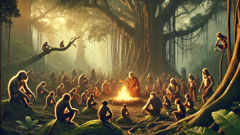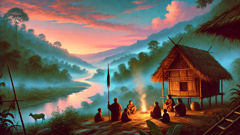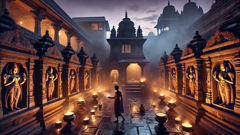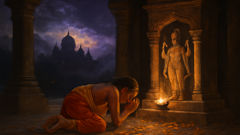Introduction
In the deep hush of a primeval forest where mango and tamarind trees braided their branches into living arches, a presence older than most human reckonings kept watch. He was Jambavan, king of the bears, a creature of fur and bone, memory and long patience. His eyes carried the slow astonishment of centuries; his voice, when it rose, had the grain of tree trunks and the warmth of hearth smoke. People spoke of him in low tones in village kitchens and temple courtyards, invoking his name as one invokes the surety of sunrise. The younger monkeys and forest folk, the vanaras, revered him because he combined the muscle of the wild with the discernment of a sage. They called him counselor, guardian, and bridge between the fierce rhythms of the wood and the human world that moved at the forest's edge. He had watched kings rise and fade, watched rivers carve new channels, watched diets of seasons change the map of flower and fruit. When Rama arrived, a stranger whose tread carried both exile and destiny, the forest held its breath and Jambavan measured that tread with a knowledge born of long seeing. He observed more than the outward forms: he read the hush of a companion's grief in the set of a shoulder, the tethered hope in a glance, the steadiness beneath a man's sorrow. Stories have been told about battles and bridges, about monkeys who leapt across oceans and demons who clattered like thunder. But there is quieter power in counsel that bends the course of events, in a hand that steadies when tempers want to rush, in an elder who remembers the shape of loss and keeps that memory as a lamp. Jambavan's counsel would be one such lamp. He moved through the forest like a shadow that knows every root, a king who wears years like armor and kindness like a cloak. This tale follows him through nights lit by lantern and starlight, across beaches where the sea rehearsed its thousand voices, into council circles where plans were sketched on sand and heartbeats. It is a story of how wisdom weighs in the scales of war, how the patient memory of an elder can point the fierce to a steadier course, and how loyalty, when girded with insight, becomes the most effective weapon of all.
The Meeting at the Edge of the Wood
When Rama first entered the forest with Lakshmana and a small retinue, the land felt like a held breath. The trees, enormous and patient, seemed to listen. Word of their arrival spread through birdcalls and the gossip of leaves, and by evening the vanara scouts had returned with the news of a man who walked like a stranger carrying a noble weight. Sugriva, who had been given refuge by the forest and the promise of allies, brought his own court together beneath a broad banyan where roots braided the earth into a natural hall. Jambavan attended, not as one who sought honor, but as one drawn by the slow gravity of duty. He had a way of sitting that gave counsel without pretense; his paw rested on the ground as if remembering the shape of the world. The meeting was full of breaths and pauses, because these were not reckless folk. They had survived through cunning as much as through force, and it was clear they understood the difference between furious energy and steady resolve. Rama, clothed in exile yet luminous with a power that made some birds settle near him as if reassured, spoke of a deep wrong. His voice did not thunder; it was a measure of mourning and intent. He told them of Sita, taken across the ocean, of a king who had been toppled, of a people who needed help. The vanaras murmured and some stirred with immediate impulse. Action is the language of youth, and there were many among them who wanted to leap, to test muscle against demon. It was then that Jambavan rose and moved forward with the deliberation of a tide. He did not rebuke. He simply sat beside Rama and folded his huge paws upon his knees, listening in a silence that drew out more than words. When he spoke, the cadence was slow and carefully chosen. He reminded the gathering of perspective: that anger without aim becomes a blade turned inward; that a battle fought for its own thunder brings hollow triumph; that counsel and planning build the bridge a single leap cannot. Jambavan did not deny the righteousness of Rama's cause. Instead he offered a stitchwork of insight—how to bring allies to resolve, how to conserve energy for the inevitable trials, how to harness the peculiar talents of the vanara kin. He suggested scouts who could trace demon routes, messengers who would carry news like flint, and tasks divided so that the strength of the many would not dissolve into a scattered storm. His words sank into the soil of their resolve as thoughtfully dropped seeds take root. The vanaras listened; even the most eager tempered their fire. There was a moment when Hanuman, still young with a flair so bright it sometimes masked his cunning, leaned in with the question that had been burning his heart. But it was not only strategy that Jambavan offered. He reached into the archive of his long memory and spoke of a lesson younger warriors sometimes forget: identity is a force that, when remembered, becomes inexhaustible. He told of times when he himself had mistaken his own strength, of nights when pride had outpaced prudence, and how the breath of years sharpens a creature's sense of what to hold and what to lay down. In that firelit hall he did something simple and humane—he made everyone understand that courage without wisdom risks becoming the very harm it seeks to undo. Rama looked at Jambavan and recognized a quality he valued: the steadiness to listen before striking, the heart to take on burdens without seeking fame. So the alliance took shape, born not from a single cry but from a gathering of minds and the slow consent that comes when counsel meets character. They named tasks, chose watchers for the borders of the forest, and formed a plan that embraced both the strengths of the vanaras and the subtlety of patient strategy. Outside the banyan, the night stretched like silk, and Jambavan walked among the camps, speaking in low tones to those whose courage needed shaping into direction. He found Hanuman by a stream, practicing leaps that made the water sing. The young vanara's spirit was a bright thing, barely contained, and Jambavan told an old story to temper that light. It was the kind of story that had no single moral but a layering of meanings: about a stream that swallowed footsteps until a rock learned to hold its place, about a thorn that taught a bird to fly higher, about a king who learned to place his crown on a lowly brow to remind himself of service. Hanuman listened and then laughed, because laughter is another form of understanding, and the two of them, elder and apprentice, planned how to turn raw devotion into a decisive instrument. As dawn touched the canopy, thoughts of strategy had softened into a broader weave of purpose. They would cross waters, gather allies, and call on the old edges of magic that live in hidden groves. But above all, they would go with a discipline that accepted loss as part of the path and refused cruelty as method. That discipline, in the telling and retelling through the night, became the greater thing Jambavan had intended to gift them: a way of war that remained a way of integrity.

Across the Sea and the Bearing of Wisdom
The task before them required more than muscle. It demanded ingenuity that could bend the coastline and patience that could wait on tides. Jambavan watched the shore where the Vanara army gathered, where logs and stone and the soft insistence of labor met the sea. He felt, in his old bones, the rhythm of building: beginnings where a sorrow becomes a scaffold, where small hands lift and set and dream of a destination beyond sight. The work toward the bridge to Lanka was not only timber and rope; it was a school of character. Men and monkeys were taught to listen to the tide's temper, to learn the language of currents and the secrets of stone weight. Jambavan organized crews with the eye of a master craftsman, pairing the quick and agile with the stoic and strong so each task had a heart. When setbacks came—not always beasts or foes but weather, night winds that insisted on their own designs—he offered solace and a steady plan. There were moments when rage at injustice threatened to loosen discipline, and in those hours Jambavan became more than an architect of timber. He became the keeper of a story about restraint. He described a mountain river that had once aimed for the sea in a single, furious rush. The river learned patience only when it met a plain and discovered its capacity to be wider than it had imagined. He used images, simple and direct, and they took root. There was a particular morning when the ocean, in a mood as old as salt, rose with a chorus that washed away a new section of the causeway. Men felt their work dissolve and fury sparked like tinder. Yet Jambavan, walking the sand with a gait that made room for grief, gathered the crews and set them to the humble art of testing stones and listening to the water's sound. He taught them to place a few stones and then wait to see how the sea answered, to learn the ocean's patience and, in return, gain hers. Slowly the bridge reclaimed its shape, built stone by attentive stone, until it held like a quiet spine across the waves. But building was only one part of what they needed to bear. There is a pain that sits within stories of war and exile—the knowledge that certain battles must be fought but the lives along the way cannot be treated as simple cost. Jambavan spoke often of the sanctity of life and of the sorrow that walks with victory when it is thoughtless. When the Vanara army staged raids on Lanka's peripheries to test defenses, he counseled restraint, urging them to spare those who did not take arms. It was a strange counsel in a world that often privileges swift and total retribution, but Jambavan knew the currency of the long term. He had seen how unchecked cruelty invites its own widening circle of pain. Within the war's cadence, these small acts of mercy carved out pockets of humanity that later proved strategic as well as moral; slaves who had been spared would whisper directions, fishermen would look away where a scout needed a blind passage. In moments of dire need, Jambavan's presence became blunt and undeniable. When a cunning rakshasa emerged at dusk and attacked a scouting party, fangs and fire-legged, the vanaras faltered. Jambavan did not rage into the fray like a storm. He moved with an economy of motion that belied his mass and used his paw to intercept a flying blade, his weight to pin a foe's limb, his roar to unnerve the darkness. The rakshasa fled, surprised that a creature of such years and calmness could be so decisively fierce. His hands, though strong enough to uproot a yoked tree, also did simpler things. He tended wounds, wrapped cloth around torn shoulders, and murmured old chants that steadied shaking hands. Soldiers, who had grown used to the narrative of youthful heroes, began to understand that elders provide more than memory: they teach rhythm, how to breathe through the moments when the mind wants to outrun the body's capacity. One night, after a harrowing sortie that revealed the labyrinthine cunning of Lanka's defenses, the army camped near a tide-pool that held starlight like a mirror. They had found a narrow pass and a rumor of a secret puppet gate used by a minor demon lord. The plan hinged on timing and faith in one another's steadiness. Jambavan sat by the pool and spoke in the voice of restful insistence. He reminded them of the lineage of guardianship that tied the forest to the human realm, of obligations that are older than crowns. He told them of his own youth when impatience had led to needless loss and how shame had taught him a better way to hold power. His lesson was not to shackle courage but to give it a steady hand, to shape bravery so it becomes a tool not a storm. The Vanara hearts, honed by repeated training and fortified by counsel, brimmed with a trust that was forged in toil and tempered in hardship. When the time came to breach the great city, courage answered without waste. Hanuman leapt with a new precision that honored his wildness while honoring the plan, Sugriva moved with cunning matched to purpose, and the countless vanaras followed charges that had been thought through, ordered into niches and tasks that matched their gifts. Jambavan watched the unfolding not from a distance but involved in the workings where patience and force met. He had always understood that war could accentuate the worst in men and animals; his work, often invisible, was to keep those edges from splintering. When triumph arrived, it did so with a cost and a kind of tempered sorrow. Sita was found, and her reunion with Rama sang in the air like a bell whose tone echoes for weeks. Yet even as joy swelled, Jambavan reminded the victors to hold grief for those lost, to remember names and to tend wounds that do not quickly close. Heroes are often remembered in their shining moments, but Jambavan's lesson was that remembrance must be practiced with humility and care. He taught them to erect small cairns for the fallen, to plant trees where camps had been, and to bind old men and women with provisions so exile's hunger did not simply walk from one household to the next. In these acts the seeds of a healed order were sown. When time folded and the war's rumble became a story told around new hearths, Jambavan returned to the forest with the slow grace of one who had added another long chapter to his store. He had done what he always valued: he had used strength to conserve life, counsel to direct action, and memory to make sure the new age remembered the debts of the old. The forest welcomed him back as it welcomes those who have labored in its name, and he resumed his watch, listening to the same birds, reading new patterns in the sky, keeping the soft vigilance of a king who understands that the truest sovereignty rests in caretaking, not domination.
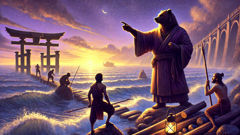
Conclusion
In the years that followed, songs would celebrate the leaping of heroes and the thunder of great clashes, and those songs are not untrue. They bear witness to the extraordinary courage of vanaras and men who faced improbable odds. Yet the forest remembers differently, recording in its slow ways the quiet ministries that make the loud ones possible. Jambavan lived on in the hush between seasons, his counsel a ripple that lengthened into the way communities rebuilt themselves. He continued to patrol the old paths, to visit temples and riverbanks, and to tell stories to new generations who needed to know that strength without wisdom is a fire that burns the hand that holds it. Villagers came to speak of him as guardian and teacher; young hunters learned how to consider the consequences of a spear's arc before letting it fly. Rama, when he returned to his rightful place and the shape of kingdom changed with time, never forgot the bear who had given counsel when cunning alone would have been insufficient. He remembered how Jambavan had steadied youth and reshaped ferocity into disciplined purpose. What Jambavan offered the world was not a legend meant only for praise. It was a pattern: that elders do not merely perform the ceremonial acts of memory but actively shape the future by teaching restraint, tending wounds, and insisting that victory be balanced by compassion. For those who study the old stories, Jambavan's example is a quiet litmus test: does a leader return from war richer only in spoils, or richer in the way the living are held and the dead are named? The bear king taught that the measure of triumph is not simply the breadth of territory won but the care taken to restore what violence took and to ensure that the future will be more habitable because of the deeds done. In the shade of the same mango groves where his tale began, Jambavan would sometimes sit and listen to the wind count in its slow voice the names of those who had passed through life beside him. He would tell children that being old is not merely an accumulation of years but an opportunity to pour that accumulation into service. That is the legacy he left: a kind of stewardship that values life, tempers strength with thought, and remembers that the truest political art is the art of caretaking. There are many kinds of kingship, and Jambavan's crown was not a circlet of gold but the trust of a community that had learned to survive and to act with reverence. If you walk now through a forest that holds memory, you might hear the echo of his voice in the rustle of leaves advising patient steps. And if you follow that counsel, you may find, tucked into the weave of the long days, a gentler way for power to dwell among the living.




